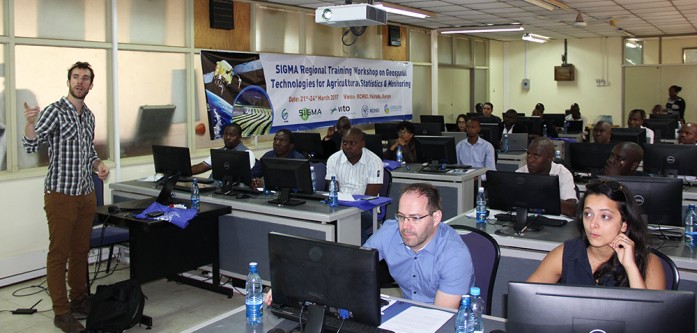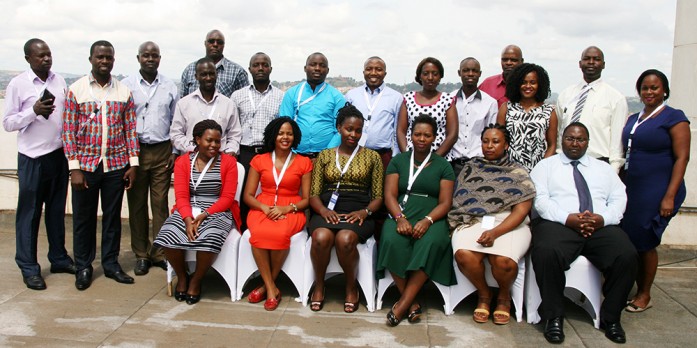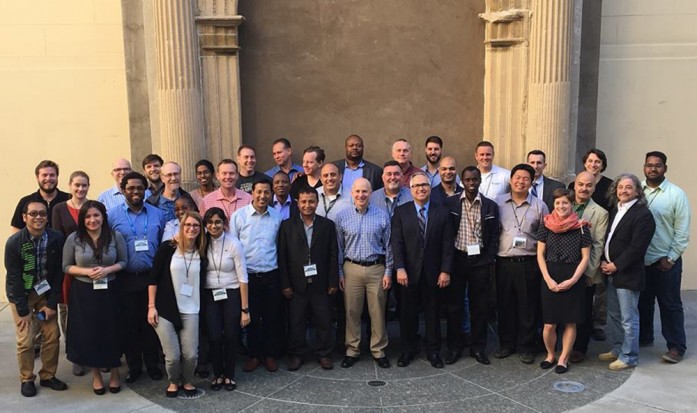
A four-day (March 21-24, 2017) SIGMA Regional Training Workshop on GIS for Agricultural Statistics and Monitoring was held at RCMRD). The workshop aimed at gathering regional stakeholders and institutions active in agricultural monitoring and statistics, and interested in innovations in satellite and in-situ geospatial technologies for monitoring of agriculture. It was organized by regional East Africa project partner RCMRD with ITC (Arno Van Lieshout, Eduard Westinga) and VITO (Roel Van Hoolst), together with expert contributors from the SIGMA partner consortium IIASA (Linda See), GISAT (Neha Joshi) and EFTAS (Carsten Haub).
ITC and VITO led the workshop whose other objectives was to impart knowledge on efficient use of Geo-Information for monitoring and mapping of various agricultural processes and systems. “During the workshop, newest methods and tools used for ground sampling, earth observation based agricultural monitoring and data validation, developed within SIGMA were exposed,” the SIGMA trainers said.
“Current progress on translation of research methods into operational monitoring were shown using hands on training sessions,” said Degelo Sendabo, RCMRD’s Remote Sensing Officer. Degelo said the features of remote sensing and GIS are the reliable means of collecting information on crop monitoring and damage assessment, crop growth modeling, crop production and area estimation.
Prof. John Kiema, RCMRD Director of Technical Services Directorate in his address said that food security is one of the major challenges that need solutions. He emphasized the role of RCMRD, which is “to promote sustainable development in the member States through generation, application and dissemination of geo-information and allied ICT technologies, products and services.”
Prof. Kiema added, “RCMRD functional programmes have moved away from service technology framework (e.g. Remote Sensing, Geodesy, Cartography etc.) to problem solving applications in natural resource and environmental management. RCMRD is now providing service on demand driven basis.” He emphasized that sustainable agricultural land use critically depends on continuous assessment and monitoring of agricultural processes.
He further said that satellite based remote sensing and geographic information system substantially increases the value of information on agricultural land usage, crop production estimation and climate change assessment. He congratulated organizers for taking lead and organizing workshop. He hoped that they would continue playing their part for development of the agriculture sector.
In the four-day workshop, participants used satellite imagery, remote sensing and GIS applications as tools at various scales in assessing the evolution of vegetation cover. The workshop also discussed the way forward in integrating new techniques into current professional workflows of the participants and regional stakeholders.
Participants from 13 countries including Burkina Faso, Ethiopia, Niger, Uganda, and Zimbabwe among others, and agricultural scientists, GIS & remote sensing analysts, RCMRD staff members and interns attended the workshop. See photos here
*Note:
The SIGMA project-Stimulating Innovation for Global Monitoring of Agriculture – is a global EU support action to GEOGLAM.

RCMRD/SERVIR E&SA held a week-long training on Climate Change Vulnerability Mapping Training in Kampala, Uganda beginning 20–24 March, 2017. The training was
SERVIR E&SA is collaborating with USAID/Tanzania’s Water Resources Integration Development Initiative (WARIDI) in applying expertise and tools to better understand climate change vulnerability and adaptation issues in the Wami-Ruvu and Rufiji river basins of southern Tanzania. WARIDI is a 5-year project providing support in water resources governance, water supply, sanitation and hygiene, and livelihoods to basin water boards, local governments and inhabitants of the two basins.
Working with regional partners among them PREPARED, ICPAC and FEWS NET and national partners in Tanzania among them Tanzania Meteorological Agency (TMA) and the Ministry of Water and Irrigation (MOWI), SERVIR E&SA is helping WARIDI develop climate change adaptation products by carrying out climate change vulnerability mapping as a product to inform impacts assessments and development of climate change adaptation measures to strengthen water use and allocations and improvement of livelihoods in the two basins.
“We are using experiences from working with PREPARED in the past 3 years and our earlier experiences working in Malawi to develop climate change vulnerability products and tools to inform climate change adaptation investments in the East African Community and Malawi respectively,” said Denis Macharia, SERVIR E&SA Weather and Climate Lead.
He continued, “for instance, we are employing vulnerability and analysis methods that we have developed and improved over the past few years together with international partners such as CIESIN.”
The first product being developed is a community climate change hotspot map for the two basins. These maps and the associated products will help WARIDI prioritize their interventions in 20 districts they are targeting in the basins.
“Further, we are approaching this work in a collaborative and co-development way through the formation of a core team of experts in Tanzania drawn from main government agencies working with WARIDI, including experts from local government authorities in the basins and water basin councils,” Macharia added.
The experts are being trained on data management and climate vulnerability mapping and in turn, they will work with SERVIR E&SA’s team to co-develop the products required by WARIDI.
“For us, it’s an approach we have applied elsewhere and one that has demonstrated value. Apart from ensuring sustainability by building a team of experts that can support projects in future, we are also giving them an opportunity to network with SERVIR and RCMRD and leaving behind a suite of tools developed through SERVIR and other initiatives that can help them in their activities,” said Macharia.
The training has been taking place in Dar es Salaam, Tanzania from 27-31st March, 2017. 18 technical staff (9 male and 9 female) drawn from nine institutions are participating. Several other trainings are planned for the next three months and it’s expected that upon completion of the trainings, the team will have produced outputs that will feed directly into WARIDI programming in the two basins.
Content for this article provided by Denis Macharia, Disaster Lead (RCMRD/SERVIR-Eastern & Southern Africa).

The SERVIR Science Coordination Office held a one-week Geospatial Information Technology (GIT) exchange at the University of San Francisco for members of the SERVIR global network from 13-17 March, 2017. Representatives from SERVIR Eastern & Southern Africa, SERVIR-West Africa, SERVIR-Himalaya, SERVIR-Mekong, USAID,